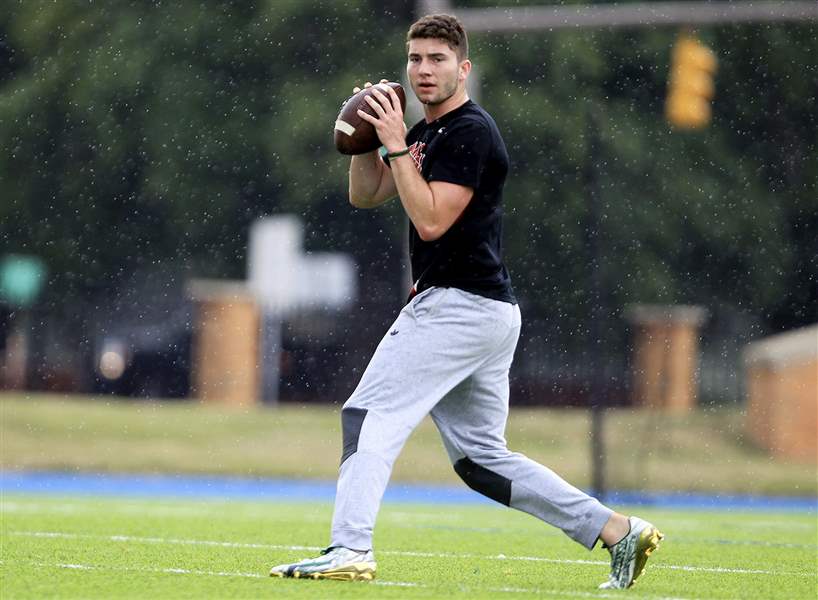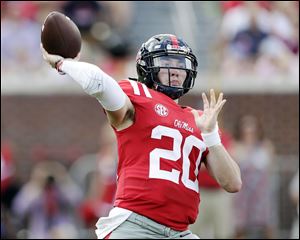
Shea Patterson builds case for eligibility at Michigan
Toledo native hopes to avoid sitting out 2018 after transfer from Ole Miss
2/14/2018
Shea Patterson practices with local football players at the St. Francis de Sales football field in July, 2016. Patterson grew up in Toledo before moving at age 11.
THE BLADE
Buy This Image
ANN ARBOR — Michigan has its quarterback. Now the Wolverines must wait to see if he can play.
When former Mississippi quarterback Shea Patterson announced his plans for transfer to Michigan in December, the decision was widely regarded as a program-altering move.
UM languished through an 8-5 season in 2017, with the quarterback position a black hole. Wilton Speight, John O’Korn, and Brandon Peters either suffered injuries or proved ineffective.

In this Oct. 14, 2017, photo, Mississippi quarterback Shea Patterson passes against Vanderbilt. Patterson is hoping to gain eligibility at Michigan for the 2018 season.
Along came Patterson, the carrot of immediate eligibility, and Big Ten championship aspirations.
But with the NCAA still to rule on his playing status for next season, is it all impractical optimism? Not according to Arkansas attorney Tom Mars, who has been retained by multiple Ole Miss players, including Patterson.
“We’re going to present an extremely convincing case,” Mars told The Blade.
After Ole Miss was hit with major NCAA sanctions including a two-year postseason ban in December, Patterson — a Toledo native — is among seven former Ole Miss players seeking immediate eligibility via a transfer waiver. The grounds for justifying a special case to the transfer rule, which requires student-athletes to sit out one season, is the egregious behavior exception.
The application for Patterson, who threw 23 touchdown passes in 10 games over two seasons at Ole Miss, is nearing completion. It will first arrive in Indianapolis at the NCAA’s headquarters before it’s forwarded to Ole Miss. Mars has worked in concert with Michigan’s compliance department.
Ole Miss has 10 business days to submit a statement supporting the request, opposing the request, or the school can choose not to respond. Ole Miss does not have to admit to or deny any allegations.
“It’s in God’s hands,” Patterson told The Blade in December in his only interview since announcing his decision to transfer. “From what I’m hearing, I’m pretty sure that I will win that and be able to play next year.”
The NCAA’s ruling is expected two or three weeks after receiving Ole Miss’ response.
“As confident as I am that Shea will be granted a waiver, it becomes something close to a no-brainer if Ole Miss supports the waiver,” Mars said.
Ole Miss declined to comment for this story.
‘Elaborate misinformation’
The core argument is that Ole Miss allegedly deceived recruits by minimizing the extent of an NCAA investigation that implicated the football program.
A bulk of the case revolves around the lawsuit filed by former coach Houston Nutt against Ole Miss, which was settled last October. Nutt sued the school, where he was head coach from 2008-11, for defaming his character in connection with NCAA violations committed by the football program. Mars represented Nutt.
Upon receipt of an official notice of allegations from the NCAA on Jan. 22, 2016 — 12 days before national signing day — the senior leadership in the Ole Miss athletic department orchestrated a plan to mislead the media by saying the allegations involved the women’s basketball and track programs while any football violations occurred under Nutt and not then-head coach Hugh Freeze.
The purpose, according to language in the Nutt lawsuit, was to conceal from the 2016 recruiting class that Nutt’s name, in fact, was not mentioned in the allegations. Of the 13 allegations including academic misconduct and impermissible benefits related to the football program, only two were committed when Nutt was the head coach.

Patterson, a five-star recruit, was the crown jewel of Ole Miss’ 2016 recruiting class, which finished ranked fifth in the nation by 247Sports.
On Jan. 29, 2016, one week after Ole Miss received its notice of allegations, Pat Forde of Yahoo Sports broke the story that the NCAA had formally charged the university with about 30 violations. There was a mobilization of sorts in Oxford that same day.
Phone records, which were part of the Nutt lawsuit, show that Ole Miss athletic director Ross Bjork retained an attorney in Atlanta who helped mislead the media about the notice of allegations. Freeze also met with Patterson, who was an early enrollee, and told him not to worry about the allegations and asked him to convey that message to potential recruits and members of the 2016 recruiting class.
On that same weekend, Ole Miss held the most important recruiting event in program history, featuring 24 recruits, including two five-star prospects and 15 four-stars. During the festivities, a parent asked Freeze to address the violations. More than a dozen witnesses have recounted the scene to Mars, who said Freeze told the audience Ole Miss might lose some scholarships, but said the allegations were all about women’s basketball, track, and Houston Nutt.
Ole Miss also tried to skirt public records laws by having the notice of allegations sent to its outside legal representation. When reporters requested a copy, Ole Miss responded by saying they didn’t have a copy; therefore, it wasn’t a public record. In May, 2016, Ole Miss finally released the notice of allegations, long after signing one of the best recruiting classes in program history.
“They organized and carried out an elaborate misinformation campaign to conceal from student-athletes and their parents a situation that would have no doubt produced vastly different results for them,” Mars said. “If these student-athletes and parents had known the truth, there’s not a single one of them that would have signed with Ole Miss.”
Terms of the settlement between Nutt and Ole Miss were not released, but Ole Miss issued an apology to Nutt, and the university never denied any allegations in the lawsuit.
Mars has spent nearly 1,000 hours on this case, which includes access to phone records, direct messages, and texts.
“Some of which are incredibly damning,” he said.
Those messages will be included in Michigan’s application to the NCAA. In a text message obtained by CBS Sports, Freeze mistakenly texts Tre Nixon, a four-star wide receiver who signed with Ole Miss in 2016, a link to a RebelGrove.com story that quotes Bjork saying the football violations were “secondary” and “minimal.”
Freeze texts, “Good PR response … get this in the recruits hands.” The message to Nixon came after he questioned Freeze why Bjork wasn’t publicly saying the penalties predated Freeze. Nixon said it sounded like the penalties were new.
CBS Sports also obtained a series of direct messages between Patterson and Nixon from Jan. 29 in which the quarterback tries to assure Nixon the penalties will be minimal.
“...don’t listen to any of that crap,” Patterson wrote. “It happened before [Freeze] was even here. The worst thing that can happen will be we lose one or two scholarships for next year. Nothing serious. It’s all good over here homie.”
Nixon was among those to transfer, choosing to go to Central Florida in January after the NCAA in December, 2017, handed down major sanctions against Ole Miss. That included extending the program’s bowl ban into 2018 and charging the school with a lack of institutional control. Ole Miss was accused of 15 Level I violations under Freeze, who resigned in July after Mars uncovered calls from Freeze’s phone to an escort service.
“Michigan has two objectives,” Mars said. “The first is to show the NCAA what the facts are. The second is to persuade the NCAA that those proven facts constitute egregious behavior and, therefore, they should allow Shea to play next year.”
Path to playing
The NCAA announced this week that it will consider proposals in June to change rules regarding transfers.
If approved by the Division I council, student-athletes who meet specific, high-achieving academic benchmarks would gain immediate eligibility after the first time they transfer. Athletes who sign national letters of intent only to have the head coach leave would also be able to transfer and play immediately.
“When a school gets put on probation, why punish the kid who had nothing do with it?” said David Ridpath, associate professor of sport management at Ohio University and a leading advocate for student-athlete rights. “Someone like Shea Patterson should be able to transfer and be eligible immediately. I do think they have a case here. It does seem like the kids were led astray. Obviously the folks at Ole Miss were doing that for their own selfish reasons.”
Two years after signing with Ole Miss, Patterson was again a signing day headliner in 2018. On the first day Jim Harbaugh met with reporters since Patterson’s transfer was made official, the Michigan coach said he had no update on when a waiver ruling would occur. Mars indicated to The Blade that they’re hopeful a response from the NCAA will come before March 22, the day Michigan begins spring practice.
“Justice Potter Stewart said in the case to define obscenity, ‘l know it when I see it,’” Mars said. “Well, there’s not going to be any question what happened here when the NCAA staff reviews it. If this isn’t egregious behavior, what is? I think it’s a no-brainer.”
Contact Kyle Rowland at krowland@theblade.com, 419-724-6110 or on Twitter @KyleRowland.